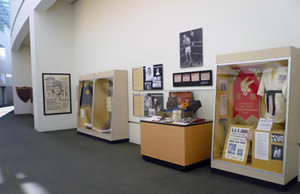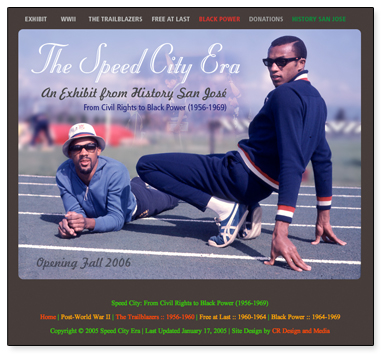The Speed City Era
Speed City: From Civil Rights to Black Power
Athletics at San José State College, 1940 to 1969
History San José Exhibit Opens at City Hall in downtown San José
San José, California – June 24, 2008
Everyone remembers the raised fists of John Carlos and Tommie Smith on the dais at the Olympic Games in 1968 in Mexico City. But it is the athletic program at San José State College in the post World War II era that was the prequel to the story.
History San José is presenting the exhibition Speed City: From Civil Rights to Black Power at San José City Hall. The exhibition, which had been on display at the Pacific Hotel in History Park, has traveled to the wing of City Hall where it has greatly enlarged to include even more artifacts.
“This is a powerful story about civil rights,” said Alida Bray, President and CEO of History San José. “We are excited to have the opportunity to bring it to City Hall where it will be accessible to a broad cross section of the community. It is important to acknowledge the people and the role that San José State’s athletics program played, both locally and globally.”

The exhibit is an in-depth examination of American sport in an era that spans the aftermath of World War II through America’s tumultuous involvement in Vietnam. The exhibition focuses on San José State College’s (now San José State University) athletic program, from which many student athletes became globally recognized figures as the Civil Rights and Black Power movements reshaped American society. San José State was selected as the focus of the exhibit as several Spartans became principal figures during this period of dramatic social transformation.
Speed City: From Civil Rights to Black Power will be in the San José City Hall, 200 East Santa Clara Street between Fourth and Sixth Streets, in downtown San José. The term, Speed City, was coined by a San José sports writer to describe the phenomenal success of San José State coaches and athletes in track and field during the 1950s. These athletes and their coaches were unusually ethnically diverse for university teams at that time, and their accomplishments were earned in spite of wide spread racism toward all people of color.
Urla Hill is the Guest Exhibition Curator. She holds B.A. s in African-American Studies and Journalism from San José State University; an M.A. in Interdisciplinary Social Sciences from San Francisco State University; and will earn a Ph.D. in American Studies at the University of Maryland at College Park. Hill has been conducting original research on Speed City since she left her job as a sports reporter and copy editor for Gannett Rochester Newspapers, Rochester, N.Y. She has lectured and written extensively on Speed City, Black Athletes, and Women’s Sports.
About History San José:
History San José is a non-profit organization dedicated to preserving and sharing the continuing history of the Santa Clara Valley. HSJ manages one of the largest and most comprehensive regional history collections in the State of California, from 1784 Spanish governmental records to twenty-first century Silicon Valley technology.
History San José 1650 Senter Road San José, CA 95112
historysanjose.org
